Content Sections
What kind of cancer care have you opted for should you have been diagnosed — or — would you opt for, should you be diagnosed?
Are you happy to place your trust in mainstream oncology, or have you been put off for one reason or another, perhaps after learning of the experiences of loved ones or friends? Or would you place your trust in an alternative to mainstream cancer care (there are many)? Do you have enough information about your options to exercise genuinely informed consent? Or like many, do you go mainstream initially, and resort to alternatives in the event of failure?
The Beljanski Integrative Cancer Conference (13-15 October) which we’ve just returned from in Jacksonville, Florida, was, in my view, one of the best examples of a demonstration of just how far alternative and integrative cancer treatments have come, when done properly. More on that a bit later.
Let’s rewind, and remind ourselves where we, societally, are with cancer, more generally.
Cancer risk
Listen up, men. Your risk of contracting cancer at some time in your life is about 50:50, and you’ve got around a 1 in 5 risk of dying from the disease. If you’re a women, the odds are only marginally better.
So say stats from the American Cancer Society, as well as stats from other industrialised nations such as the UK and The Netherlands.
>>> Top 10 cancers by rates of new cancers and deaths (USA)
>>> 20 most common causes of cancer deaths (UK)
But that’s only the case if you live in a so-called ‘developed’, Western nation. These countries have around twice the lifetime cancer risk compared with the global average, this latter average being lower for multiple reasons, including younger age structures and less long-lived populations, but possibly also because of more physical activity, less ultra-processed foods, and a higher proportion of people living rural lifestyles.
In Europe, there are around 3.9 million cancer diagnoses each year, and around 1.8 million cancer-related deaths. The big four – namely breast, prostate, lung and colorectal cancers – typically represent about half of all diagnoses.
All of this means that cancer has often tragic impacts at a personal and familial level, but it also means it’s big business. Very big business, in fact. The oncology drugs sector alone is worth nearly US$210 billion now, with expected growth to a staggering US$484 billion by 2030.
The first national ‘War on Cancer’
Despite the “war on cancer” having been declared in the US by President Richard Nixon in 1971, progress during this more than half a century, has been less than spectacular. The biggest decline has been seen in deaths from lung cancer (which is associated largely with declines in smoking rates), while modest declines have also been seen in deaths from breast and colorectal cancers. Death rates from the 7 other top cancers have more or less flat-lined over the last 50 years (see Fig. 1).
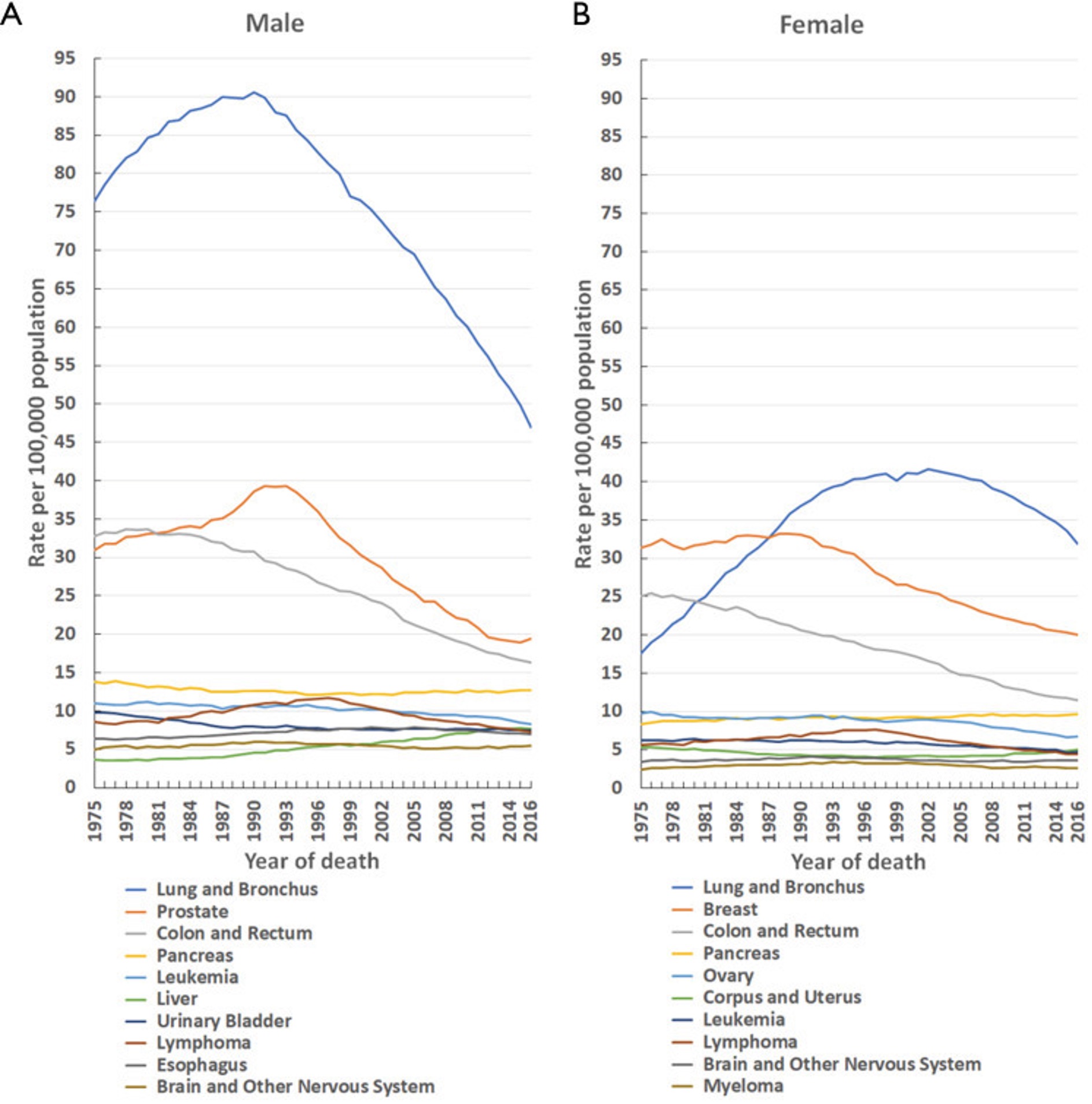
Figure 1. Trends in the mortality rate of the 10 leading causes of cancer death by sex in the United States [1975–2016]. Source: Yang et al. Ann Transl Med. 2020; 8(24): 1671.
Nixon signs National Cancer Act, 1971
The arsenal of weapons used in the ‘war’ continues to evolve, more is understood about the disease and its extraordinary complexity, but improvements in outcomes among mainstream cancer treatment providers, except in cases of breast and colorectal cancers, have been disappointing.
Attacking cancer as if it were some kind of extraneous pathogen suggests a Pasteurian mindset is still prevalent, and most mainstream approaches have involved poisoning, radiating, blocking or cutting out metastases while doing very little about the underlying terrain that created the cancer in the first place. All of this fits well with a war analogy. Like any wartime technology, accuracy is important, so precision has been a big feature of more recent developments, whether through better targeting of chemotherapeutic agents or radiation, the use of agents that are more selective to cancer as compared with normal, healthy cells, or by identifying people who are thought to be more intrinsically vulnerable to serious metastatic disease or are more or less responsive to specific agents. Diagnostics for most cancers has also improved considerably, making it even more remarkable that trends in death rates for 7 of the top 10 cancers have been so static.
The selection of both treatments and patients has been increasingly informed by genetics, bolstered by the widespread support of the still questionable Somatic Mutation Theory by cancer researchers aka drug companies, this being just one of several competing theories of cancer causation. Other theories that attempt to explain the origin of cancer (carcinogenesis) include the Metabolic or Mitochondrial Theory, and the Tissue Organization Field Theory.
Left field thinking offers new opportunities
Dissatisfied with each of the existing theories, Mark Lintern, a British graphic artist, spurned by his own skin cancer diagnosis and his loss of a close friend to cervical cancer, has spent 8 years investigating the field, only to come up with strong scientific arguments in support of yet another possible theory for the origin of cancer. Lintern calls it the Cell Suppression Theory and his work is the subject of a fascinating, 600+ page book, published earlier this year, called The Cancer Resolution? Cancer Reinterpreted Through Another Lens. Through my own work as a scientific advisor to the UK’s integrative cancer care charity, Yes To Life, I have got to know Mark well over these last few months and have a huge regard for his achievement, his passion, his determination to find new approaches that might be more successful than current standards of care, and, most recently, his perseverance to have his theory evaluated both experimentally and clinically.
As is the case in any field, especially those that challenge the status quo, there are unsung heroes. The integrative cancer field has many, their work often having been dismissed, condemned or marginalised by the all-powerful, mainstream cancer establishment.

Winning the War on Cancer revisited
Accordingly, it was a remarkable privilege to listen to and discourse with so many of those still among us who have been in the front lines of developing effective, integrative cancer treatments. The event in question was the 3-day, inaugural Beljanski Integrative Cancer Conference, held in Jacksonville, Florida, between 13 and 15 October. The conference carried the slogan “Winning the War on Cancer” which, I have to say, I interpreted as something along the lines of “Mainstream oncology, you’ve given it your best shot, it’s now time to recognise that cancer can only be overcome through better integration of largely natural approaches that work with, not against, the body”.
Four of us from ANH were fortunate enough to be able attend the conference, namely Meleni Aldridge (ANH-Intl executive coordinator and ANH-USA board member), Jo Twombly (deputy director, ANH-USA), Ruth Westreich (board member, ANH-USA) and myself (executive director, ANH-Intl and ANH-USA).
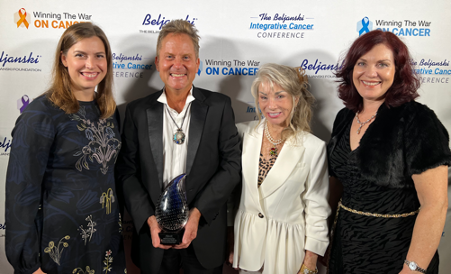
Left to right: Jo Twombly (deputy director, ANH-USA), Rob Verkerk (executive & scientific director, ANH-Intl and ANH-USA), Ruth Westreich (board member, ANH-USA), Meleni Aldridge (executive coordinator, ANH-Intl; board member and treasurer, ANH-USA)
The conference was hosted by cancer coach Nathan Crane, who I interviewed on Speaking Naturally along with Sylvie Beljanski prior to the conference (see below).
Rob Verkerk Speaking Naturally with Sylvie Beljanski and Nathan Crane
This incredible work, much of it delivering outcomes that can only be dreamed about in mainstream cancer care (this apparently radical assertion being based on detailed comparisons made by Hope4Cancer and its 1 year and 5 year survival data against SEER data), is not the product of billions of dollars of research funds. Rather, it’s the product of deeply inquisitive, open minds, profound knowledge of the complexity of the disease and its relationship to mind state and life history, decades of clinical or research experience, very big hearts, and a desire to do the maximum possible good for cancer patients.
A theme that linked most, if not, all of the speakers, was the recognition of cancer as a disturbance to a natural healing process in the body. This healing, including the total remission and hence clearance of tumours, is something the body is generally capable of doing, but only if it changes its state and function. The shift in a body that moves from a normal healthy state to one that develops tumours is not a one-way street. It can be reversed, this having been demonstrated time and time again — at least in some individuals and with specific combinations of therapy. This self-healing process is all about providing the body with the right kind of support, and while on occasions this might necessitate radical initial intervention, self-healing in the body can always be promoted by providing optimal conditions. This might be by altering the physiological, biochemical, bioenergetic, psychological, social, environmental or spiritual domains of the individual with cancer – and best of all, all of the above.
We will circulate more information once the recordings of the event are released, but in the meantime, here is a selection of highlights:
- Dr Gerry Curatola, a leading, New York-based practitioner and educator in holistic, restorative biologic dentistry, stressed the importance of the relationship between the health of our mouths and the health of our whole bodies. He referenced that healing needs to occur at multiple levels: biochemical, microbial, bioenergetic, psycho-emotional and spiritual. He also emphasised the use of natural toothpastes, including one his team has developed called Revitin, that promote, rather than kill with detergents and fluoride, the healthy microbiota within the buccal cavity.
- Dr Antonio Jimenez MD ND is the director and founder of Hope4Cancer Centers in Tijuana and Cancun, Mexico. A profound belief has been the driving force behind his dedication to the study of effective, natural cancer treatments firmly grounded in scientific principles. His journey has taken him to over 70 countries around the world, where he’s engaged in knowledge exchange and collaboration with leading experts and institutions in the field of integrative oncology. His research and clinical experience have been coalesced into his book the Seven Key Principles of Cancer Therapy (2021, Envision Health Press), which also serves as the cornerstone of Hope4Cancer's unique treatment approach. The approach is designed not only to combat the disease but to holistically address the well-being of the entire body. Among the nutrients and botanicals administered intravenously at the Hope4Cancer Centers are vitamin C, oliphenolia, resveratrol, Boswellia, quercetin, curcumin, green tea EGCG, Myers cocktail, vitamin B17 (laetrile), shogaol, artesunate and hypericin. A huge array of other therapies are also employed including Sono-Photo-Dynamic Therapy (SPDT), histotripsy, various immunotherapies (e.g. AARSOTA, Helixor (mistletoe), Salvus, MAF, RNA Thymus Therapy, Hydrogen Therapy, Thai Bio-Immunotherapy), Hyperbaric Oxygen Therapy, Ozone Therapy, UV blood irradiation, probiotic therapies, and many forms of behavioural, emotional and spiritual therapy. And what about outcomes? Bearing in mind most patients who come to Hope4cancer Centers are advanced Stage 4 cancer patients who’ve been written off as terminal by the mainstream sector, the outcomes are truly remarkable. Estimated 5 year survival data for patients with metastatic cancer treated at Hope4Cancer between 2015 and 2019 (n = 1924) was on average 50%, rates for ovarian and pancreatic cancer being a remarkable 52% and 35%, respectively. Possibly even more importantly, quality of life evaluation revealed a composite Quality of Life Score (based on Hope4Cancer’s proprietary SPROUT survey) of 93% for 91 patients surveyed in 2023.
- Dr William Pawluk, an internationally recognised authority on magnetic field therapies, especially the use of pulsed electromagnetic field (PEMF) devices, explained how healing from cancer, and indeed any physiological dysfunction, can be accelerated dramatically with the use of pulsed electromagnetic fields, including the Russian-developed magnetoturbotron, a process he typically monitors via circulating tumour DNA (ctDNA) screening (the Galleri test).
- Integrative supervet, Dr Marlene Siegel, amazed us with her case studies, peppered with before and after videos, of pets who had recovered from life-threatening injuries and diseases, including cancer. She uses a 6 step process that addresses pollution, nutrients, gut healing, detoxification, mitochondria and the clearing of trapped emotions. For the latter, she finds acoustic therapy (music) invaluable, and we witnessed videos demonstrating radical changes in behaviour that facilitated healing after animals were exposed to less than a minute of this music. When will primary care for humans become this holistic?
- Steve Bhaerman, who co-wrote, with Bruce Lipton, the book Spontaneous Evolution (2009, Penguin Random House), delivered a different kind of medicine: humour. As his alter ego, Swami Beyondananda (a character he first brought to life in the 1980s), a protagonist of cosmic comic consciousness, Steve delivered the gala night, after dinner entertainment. He had us in stitches when he predicted that ‘living in the now’ would become the wave of the future, and discussed truth decay and electile dysfunction. His presentation the next day was more informative than entertaining and showed just how effective humour can be as a medicine, changing our internal physiology, mental state and engaging deeper breathing. We’ll be running a Speaking Naturally interview with Steve in the near future – be prepared to laugh.
- Dr John Hall, the director of research for the Beljanski Foundation, has been heading up the foundation’s research program for the last 15 years. He graduated in biochemistry from New York University (NYU) after initial studies at Princeton University, and continued his research as a post-doctoral fellow, then as a professor, at Rockefeller University, focusing on the fundamental mechanisms relating cell motility to cell division and cancer. There is also a fascinating connection: Dr John Hall was awarded his PhD in biochemistry in the same department in which Mirko Beljanski, the remarkable cancer scientist whose work the Beljanski Foundation is based on, was visiting as a research fellow in Severo Ochoa’s laboratory at NYU in 1950. He has overseen multiple studies on the Beljanski extracts carried out by prestigious American institutions.
>>> Find out more about the remarkable life of Mirko Beljanski PhD and how the French cancer establishment and government responded after discovering the power of his extracts used to treat President Mitterand.
>>> Read Sylvie Belkanski’s book, Winning The War on Cancer: The Epic Journey Towards a Natural Cure [2018, Morgan James Publishing].
- Qigong master, Mingtong Gu said he wasn’t interested in diagnoses, he was only interested in people. He proposed that when doctors say a particular disease is incurable, they really just mean they can’t help the person. He talked about the opposing effects and emotional states associated with the contraction and expansion of the body’s energy field, as defined by the Zhineng qigong tradition. For example, the contracted energy of heart leads to hurt or hate, while its expanded form to greater joy, a sense of love, and peace. The contracted field of the liver and spleen leads to being immune compromised and angry, while in its open state it inspires courage. The qigong master later engaged his audience in a demonstration in which we used the tonality of our voices to expand our energy fields to help them resume their natural, open and flowing state. There are free meditations and other resources available from the Chi Center in Santa Fe, New Mexico, led by Master Mingtong Gu, the base for what has become a global program of workshops including thousands of online participants and sold-out retreats.
- Dr Isaac Eliaz – a pioneer of integrative medicine – who has long focused on cancer and immunity since the 1980s, explained what he calls the survival paradox, the subject of his bestselling 2021 book of the same name. This is the condition where the body’s survival mechanism fails to turn off and then turns against the body. The mind-body based solutions, as with any integrative approach, are multiple and some might argue inconvenient when compared with those which require only a pill to be popped or an occasional infusion delivered. But the results speak for themselves.
- Another great pioneer of integrative cancer and many would say, a maverick, is Dr Thomas Lodi, who changed the face of integrative cancer through the ground-breaking outcomes he’s achieved since establishing his practice at An Oasis of Healing in Mesa, Arizona. In his presentation he focused particularly on the role of microbes, both positive and negative, and how to find ways of re-establishing healthful microbial communities that should be a central strand of any protocol that aims to restore health. Among the tools used to restore immunological balance are photo-dynamic therapy that can be tuned to control bacteria, viruses and fungi in the body through its generation of radical oxygen species, histotripsy (a form of ultrasound) and Gc-MAF immunotherapy. Dr Lodi finished by reminding his audience of the power of the mind, asserting: “A negative thought can kill you quicker than a bad germ.
- Dr Henning Saupe held the flag for European clinicians, being the medical director of the Arcadia team working out of the Arcadia Praxis clinic in Bad Emstal, Germany. The clinic employs a very diverse range of therapies that contribute to its unique 'Arcadia way to health" that includes nutritional modalities, biological infusions, dichloroacetate (DCA), intravenous oxygen, magnetic field therapy, hyperthermia, and energy work
ANH-USA award from the Beljanski Foundation
It was a great privilege to receive, on behalf of ANH-USA, the Non-Profit Excellence Award from the Beljanski Foundation, recognising “remarkable commitment to advancing holistic healing practices.”
A video of my acceptance speech and some photos follow:
Watch Rob's award acceptance speech
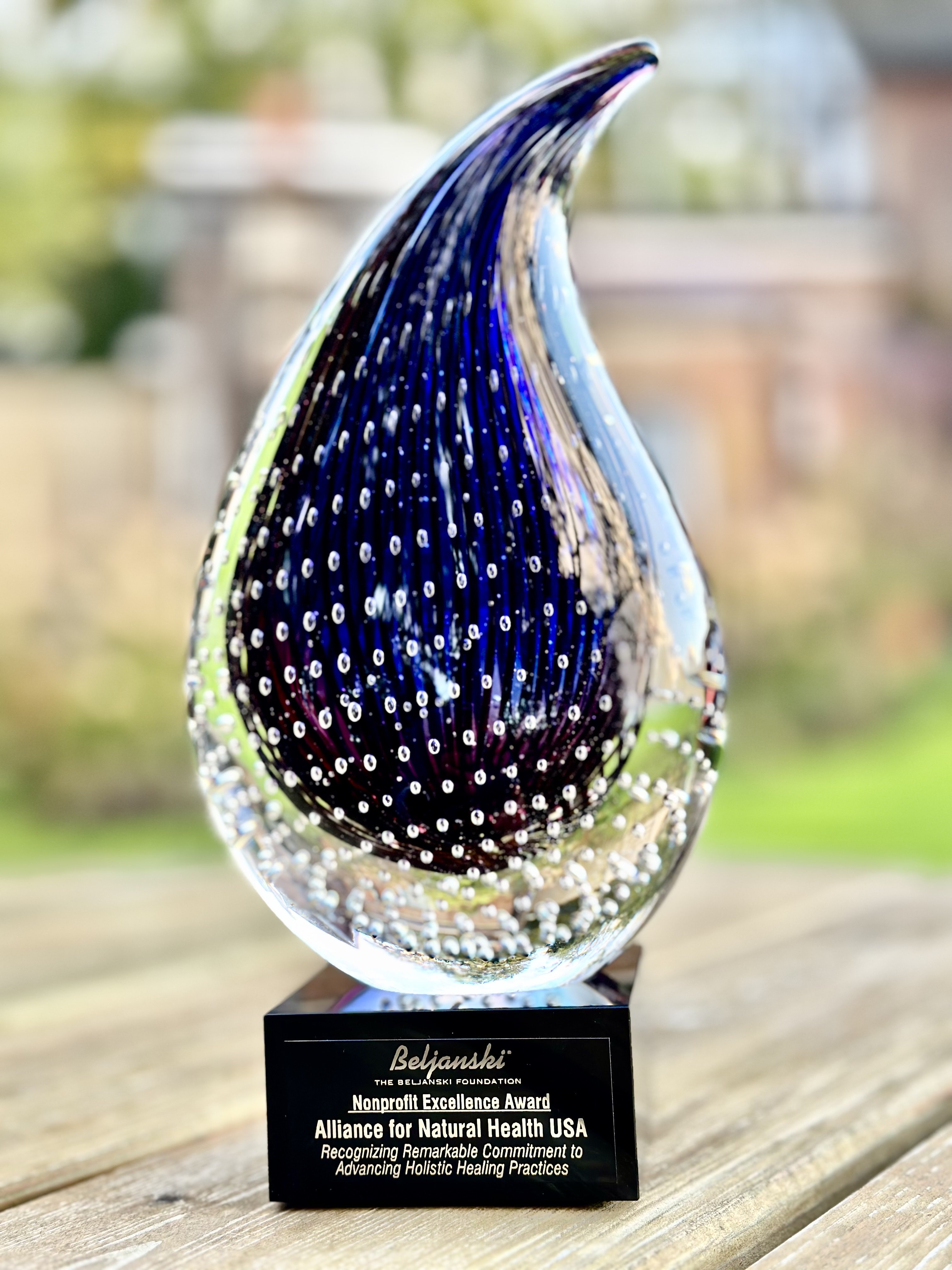
Beljanski Foundation award to ANH-USA
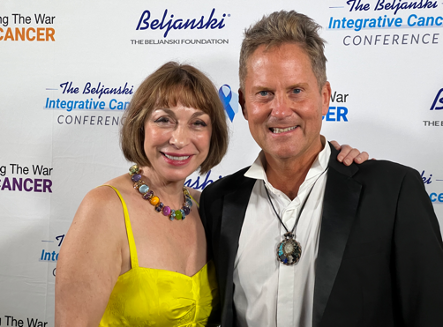
Left to right: Sylvie Beljanski and Rob Verkerk
About the Beljanski Foundation’s mission
We can’t say it better than the Beljanski Foundation’s mission statement on it’s website:
“Confronted with increased pollution and epidemics of cancer and other chronic diseases, the overall mission of The Beljanski Foundation is to study and share knowledge of effective non-toxic natural answers that work both alone and in synergy with traditional western medicine. These values, at the very core of integrative medicine, are the legacy of Mirko Beljanski, PhD (1923-1998), the French biologist who uncovered the link between environmental toxins and carcinogenesis when he was working at the Pasteur Institute in Paris. The Beljanski Foundation is a 501(c)(3) nonprofit organization based in New York City.”
>>> Find out more about Mirko Beljanski PhD, who’s work, and life, was destroyed by French authorities when they discovered the remarkable, anti-cancer properties of the plant extracts he had developed during the 1990s.
We will provide the relevant links once the professional footage from the conference is available.
>>> If you’re not already signed up for the ANH International weekly newsletter, sign up for free now using the SUBSCRIBE button at the top of our website – or better still – become a Pathfinder member and join the ANH-Intl tribe to enjoy benefits unique to our members.
>> Feel free to republish - just follow our Alliance for Natural Health International Re-publishing Guidelines
>>> Return to ANH International homepage




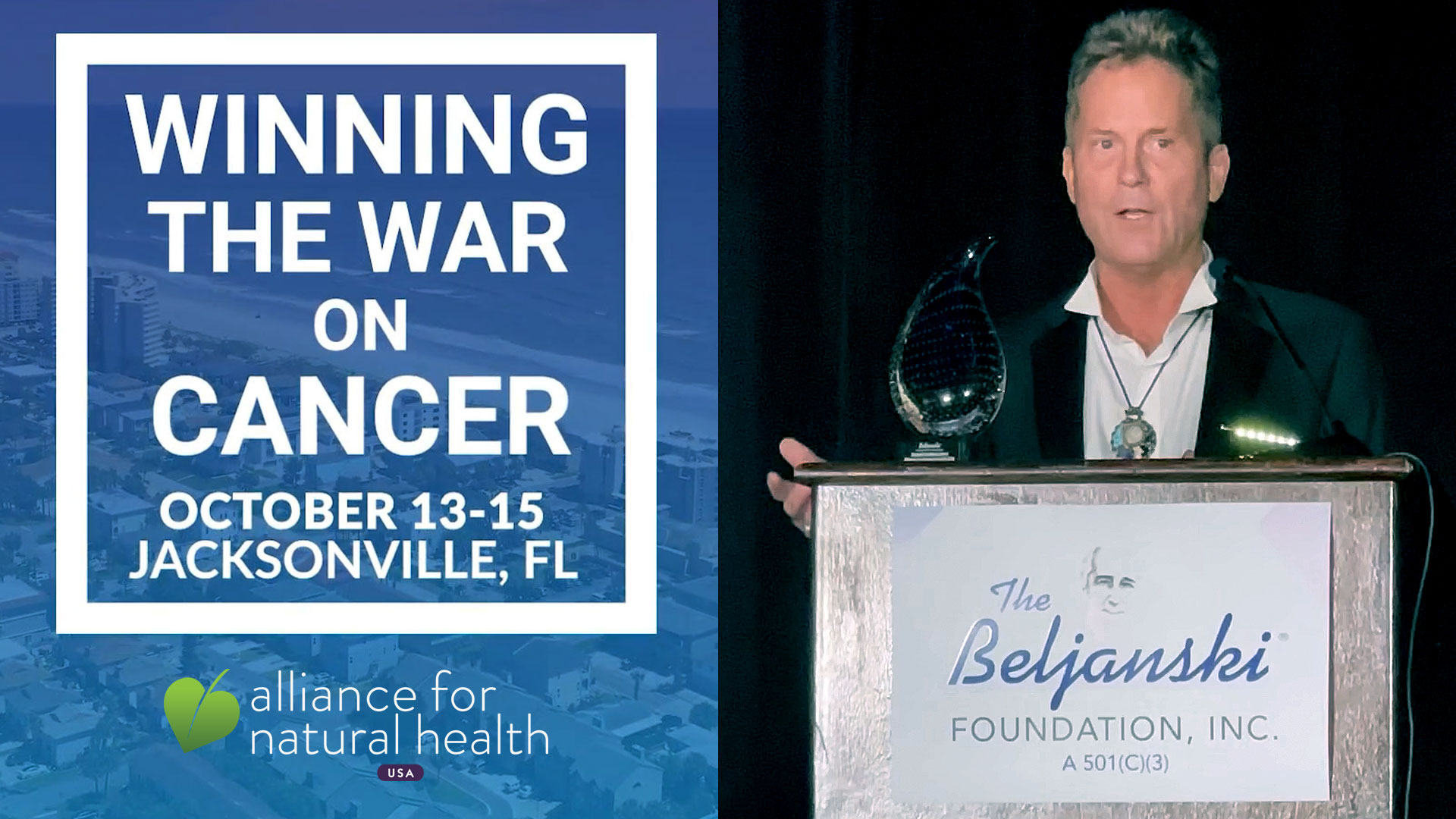

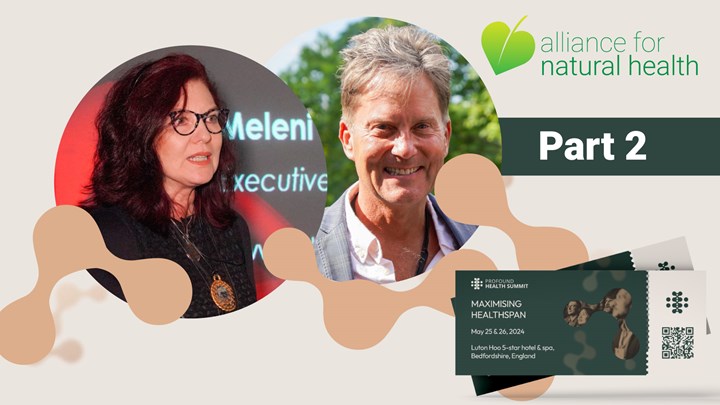

Comments
your voice counts
29 October 2023 at 9:37 pm
Re "war on cancer"
Most people would be much smarter and better informed if they had awareness of what the "war on cancer" movement (and the "Breast Cancer Awareness" movement, etc) does NOT raise awareness about.
The official mainstream "war on cancer" has been an unofficial "war" on the unsuspecting public: to keep them misinformed and misguided about the real truth of this "war." The latest program/"promise" is an extension or reincarnation of the enduring deep racket.
This PHONY official "war" was never meant to be won but to be CONTINUED (preferably endlessly, at least for decades) so that the criminal BIG allopathic medical business (the medical mafia) built around them makes insane profits and defraud the general naive/foolish public, which they've been doing successfully ... so "THEY ARE winning THEIR war against the general forever-naive/forever-foolish public"..
The orthodox cancer establishment has been saying a cure for cancer "is just around the corner" and "we're winning the war on cancer" for decades. It's almost all hype and lies (read Dr. Guy Faguet's 'War on cancer," Dr. Sam Epstein's work, or Clifton Leaf's book, or Dr. Siefried's work on this bogus 'war', etc). The criminal medical establishment deliberate and falsely self-servingly claims and distorts a 'win' in the bogus 'war on cancer' when the only truly notably win is a reduction in lung cancer mortality due to a huge reduction in smoking (eg ca. 40% reduction of the overall cancer death rate in men between 1990-2006 was because of a large reduction in cigarette smoking [https://tinyurl.com/ypk4ccyj]), which has NOTHING to do with their cancer treatments. Lying is their mode of operation.
Since the war on cancer began orthodox medicine hasn't progressed in their basic highly profitable therapies: it still uses primarily and almost exclusively highly toxic, deadly things like radiation, chemo, surgery, and drugs that have killed millions of people instead of the disease.
As long as the official "war on cancer" is a HUGE BUSINESS based on expensive TREATMENTS (INTERVENTIONS) of a disease instead of its PREVENTION, logically, they will never find a cure for cancer. The moonshot-war on cancer inventions, too, includes industry-profitable gene therapies of cancer treatment that are right in line with the erroneous working model of mechanistic reductionism of allopathic medicine.
The lucrative game of the medical business is to endlessly "look for" a cure but not "find" a cure. Practically all resources in the phony 'war on cancer' are poured into TREATMENT of cancer but almost none in the PREVENTION of the disease. Eg, Heidi Williams, the director of science policy at the Institute for Progress, explained that from the time the "War on Cancer" was announced, in 1971, until 2015, only six drugs were approved to prevent any cancer. From 1973 to 2011, nearly 30,000 trials were run for drugs that treated recurrent or metastatic cancer, compared with fewer than 600 for cancer prevention.
It's IRREFUTABLE PROOF POSITIVE that BIG MONEY and a TOTAL LACK OF ETHICS rule the official medical establishment.
It's just like with any bogus official "war" ('war on drugs', 'war on terrorism', 'war on covid' etc) --- it's not about winning these wars but to primarily prolong them because behind any of these fraudulent "war" rackets of the criminal establishment is a Big Business, such as the massive cancer industry. The very profitable TREATMENT focus of conventional medicine, instead of a PREVENTION focus which these official medical quacks (or rather crooks) can hardly make any money off, is a major reason why today 1 of 2 men and 1 in 3 women can expect a cancer diagnosis at some point in their lifetimes (https://tinyurl.com/ypk4ccyj) yet that rate was multiple times lower 5 decades ago when the phony 'war on cancer' began (1 in about 16) and the current much higher rate cannot at all be attributed solely to an aging population. And 5 decades ago when this bogus war began cancer was the second leading cause of death and 50 years later it is STILL the second leading cause of death in the country this "war" was declared in (https://tinyurl.com/ypk4ccyj). These facts alone prove we are NOT winning the war on cancer.
At the same time, this same orthodox cancer cartel has been suppressing and squashing a number of very effective and beneficial alternative cancer approaches. You probably guessed why: effective, safe, inexpensive cancer therapies are cutting into the astronomical profits of the medical mafia's lucrative treatments. That longstanding decadent activity is part of the fraud of the war on cancer.
If the public were to scrutinize what the medical industry and its government pawns are telling them about the 'war on cancer' instead of blindly believing what they're saying, they'd find that the cancer industry and the cancer charities have been dismissing, ignoring, and obfuscating the true causes of cancer while mostly putting the blame for cancer on the individual, denying or dismissing the serious harms from orthodox cancer treatments and chemical toxicants, and resorting to deceptive cancer statistics to "educate" (think: mislead) the public that their way of treatment is actually successful -- read this well referenced scholarly article's ("A Mammogram Letter The British Medical Journal Censored") afterword on the war on cancer at https://www.rolf-hefti.com/mammogram.html (scroll down to the afterword that addresses the fraudulent 'war on cancer').
What the medical establishment "informs" the public about is about as truthful as what the political establishment keeps telling them. Not to forget, the corporate media (the mainstream fake news media) is a willing tool to spread these distortions, lies, and the scam of the war on cancer.
Does anyone really think it's a coincidence that double Nobel laureate Linus Pauling called the 'war on cancer' a fraud? If you look closer you'll come to the same conclusion. But...politics and self-serving interests of the conventional medical cartel, and their allied corporate media, keep the real truth far away from the public at large. Or people's own denial of, or indifference to, the real truth.
26 April 2024 at 12:43 am
It's more than cancer that hyperbaric chambers help with. If people, especially women would stop getting mammograms and start getting thermography that would be a huge help in slowing down cancer development.. Yes, even though it's not paid for by insurance, but for me it's one of the best things I pay for all year. Thermography picks up a pre-cancer, a DOZEN years before mammography does. Brain issues are also remedied by hyperbaric chambers and I'm sure many more conditions could be helped by this amazing machinery. I will end with: I'm with Dr. Pauling, one of my favorite people, that the 'war on cancer' is a fraud and will never be a one cure fits all!
Your voice counts
We welcome your comments and are very interested in your point of view, but we ask that you keep them relevant to the article, that they be civil and without commercial links. All comments are moderated prior to being published. We reserve the right to edit or not publish comments that we consider abusive or offensive.
There is extra content here from a third party provider. You will be unable to see this content unless you agree to allow Content Cookies. Cookie Preferences